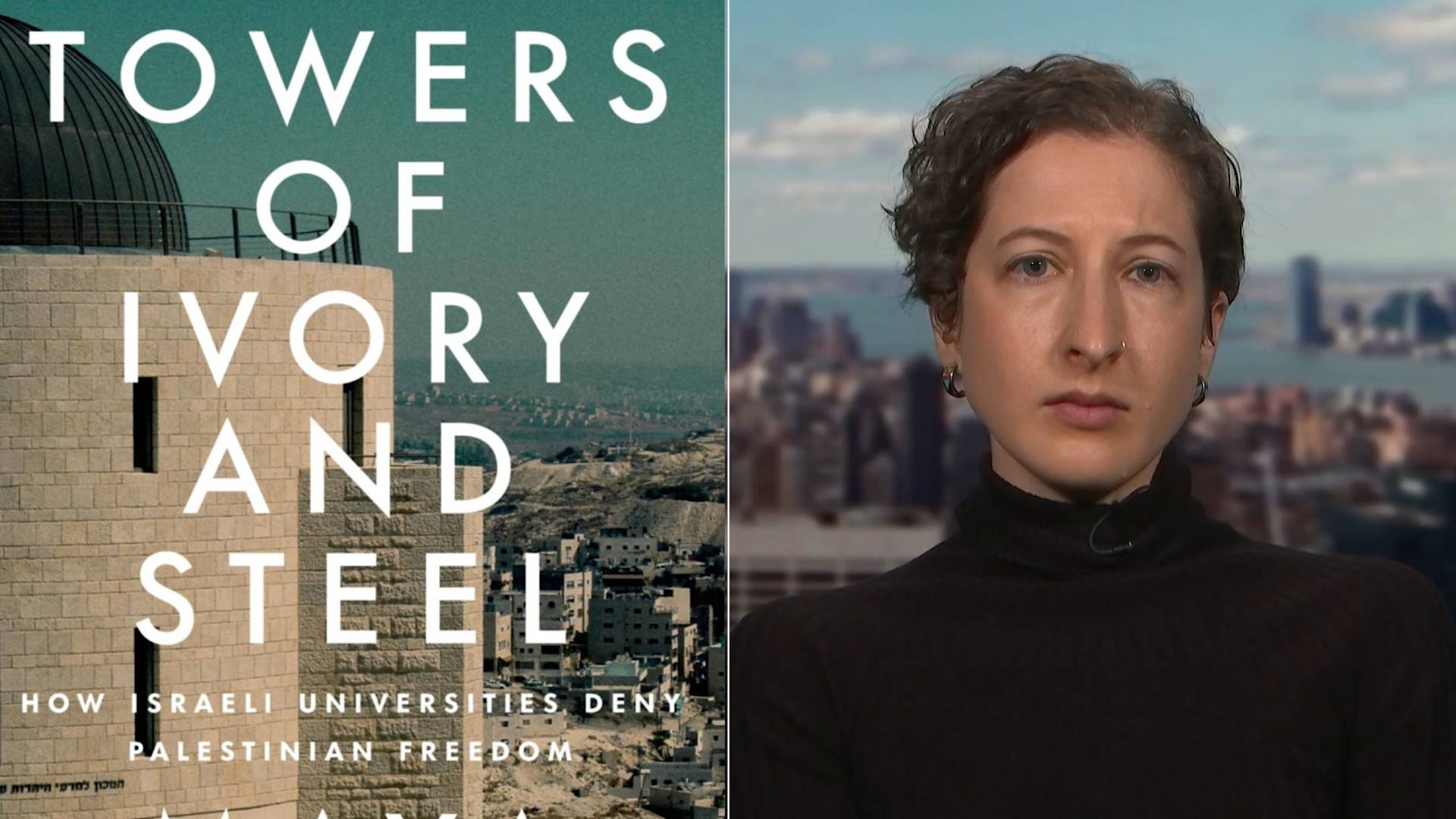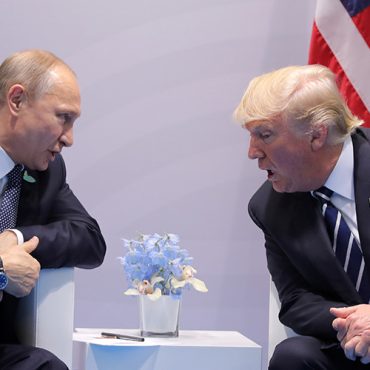This is a rush transcript. Copy may not be in its final form.
AMY GOODMAN: This is Democracy Now! I’m Amy Goodman.
We are looking now at how the attack on Palestinian rights comes not just from the Israeli military, but, our guest says, an Israeli author — but from Israeli universities, as well. That’s according to a new book called Towers of Ivory and Steel: How Israeli Universities Deny Palestinian Freedom. It documents how, quote, “Academic disciplines, degree programs, campus infrastructure, and research laboratories all service Israeli occupation and apartheid,” it says, “while universities violate the rights of Palestinians to education, stifle critical scholarship, and violently repress student dissent,” unquote.
The book’s author is joining us now. She is Maya Wind, postdoctoral fellow in the Department of Anthropology at the University of British Columbia. Maya Wind is a Jewish Israeli scholar who grew up in Jerusalem. When she was 18, she refused to enlist in the army, served 40 days in a military prison.
We welcome you to Democracy Now!, Maya Wind. If you can respond to what’s happening right now to professor Shalhoub-Kevorkian, her suspension by Hebrew University, and how you see it in a larger context?
MAYA WIND: Yeah. Thank you for having me, Amy.
And let me really start by saying that I’m one of the countless young scholars who have learned so much from professor Shalhoub-Kevorkian’s uncompromising research and analysis. And it is truly a travesty that Hebrew University has not only been attempting to silence her for years, but is now effectively expelling her for exposing Jewish Israelis to uncomfortable truths.
And I think this really speaks to the larger problem, which is that in the West, Israeli universities are considered bastions of pluralism and democracy, but, in fact, Palestinian faculty, scholars, students, activists have for over two decades contended that they are a central pillar of Israel’s regime of oppression against Palestinians. So, PACBI, which is the Palestinian Campaign for the Academic and Cultural Boycott of Israel, issued a call back in 2004 to boycott Israeli universities on the basis of this complicity. And as my new book shows, Israeli universities are indeed deeply, deeply implicated in the violation of Palestinian rights.
And as you began in the opening segment, it is important to note that Israel has destroyed every single Palestinian university in the Gaza Strip. So it is not only committing genocide, but also what Karma Nabulsi and other Palestinian intellectuals have long called scholasticide, the intentional destruction of Palestinian education. And this genocide is not only enabled by the rise of the far right or overzealous military leaders, it is, in fact, central — it is part of a project, of an over 75-year project, of the Zionist movement and the Israeli state to eliminate and replace Palestinians with Jewish Israelis. So, genocide is structural to the Israeli state and is sustained by its most liberal institutions, including its universities.
And just now, it is not only that Israeli universities sustain apartheid and violence against Palestinians for decades, but they are currently participating in this genocide. Hebrew University, among others, are training intelligence soldiers to create target banks in Gaza. They are producing knowledge for the state, whether it’s Hezbollah, which is state propaganda, or legal scholarship to help thwart attempts to hold Israel accountable for its war crimes, such as the case brought to the ICJ by South Africa. And they are, in fact, actually granting university course credit to reserve soldiers returning from Gaza to their classrooms. So, Israeli universities are deeply complicit in this genocide.
AMY GOODMAN: Maya Wind, you refused to serve in the Israeli military back 15 years ago, and you were imprisoned for that. Why then? And how does that inform what you do today?
MAYA WIND: So, yes, I was part of a small movement resisting the draft, a movement that unfortunately has not grown in the 15 years since. And this is one of the reasons, one of the many reasons, that it is absolutely essential for people, especially in the United States, which is fully enabling this genocide, to join the movement to Boycott, Divestment and Sanctions, and particularly to participate in the academic boycott and sever ties from — of our own universities and our own institutions from Israeli universities, which are implicated in the violation of Palestinian rights and now in genocide, precisely because we need the intervention of international civil society to hold Israelis accountable for these crimes.
AMY GOODMAN: Let me bring back in professor Shalhoub-Kevorkian. What does it mean to have Jewish scholars and students like Maya Wind to be joining with you, speaking up in your behalf to challenge your suspension?
NADERA SHALHOUB–KEVORKIAN: Yeah, well, I think that Maya’s book is a very important book, and those voices are extremely important to really challenge the system and that system of oppression and of the genocidal process. Amy, you know, in class, I do have students, Jewish — mostly Jewish, actually — and Palestinians. I am teaching for years in the Department of Criminology, where lots of our students are serving in different places — the army, the police and so on. The fact that the whole academic space is being turned — and I think teaching and talking and discussing and working and agreeing and disagreeing is very important, is very healthy, is a space to discuss. And this is why it’s not anti-Jewish behavior, saying no to the genocide. It’s not antisemitism to say no to genocide, because my Jewish students are — like Maya and like many others, are really with me in the same path.
What we’re saying here is that — and it’s very important, because it’s with the voices of dissent from around the world, from different — from South Africa, my colleagues to the U.S. and to the U.K. These voices are helping us really explain, number one, that this situation, that the fact that people can be threatened because of their — they can’t speak up, and they can’t talk about abuses and atrocities, should not continue, that the ongoing genocide — and we should call to stop this ongoing genocide, against any people, not only my people. But I’m saying it, that I would — as I was talking about the Rohingya and in Sudan and in other places, against apartheid, against ethnic cleansing. And I think that working together as an anti-oppressive scholars and groups, Jews, Palestinians, Blacks, Native scholars and so on, is the right way. Choosing to punish me and to punish the students is really very problematic, dangerous, and really threatens [inaudible] —
AMY GOODMAN: Professor Nadera Shalhoub-Kevorkian, I want to thank you for being with us, as well as Maya Wind, author of Towers of Ivory and Steel. I’m Amy Goodman. Thanks so much for joining us.











Post comments (0)